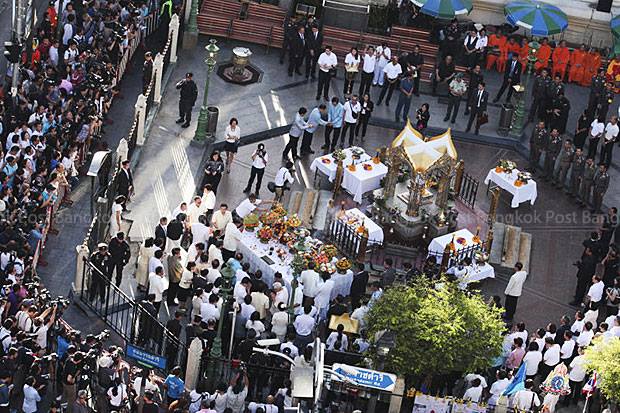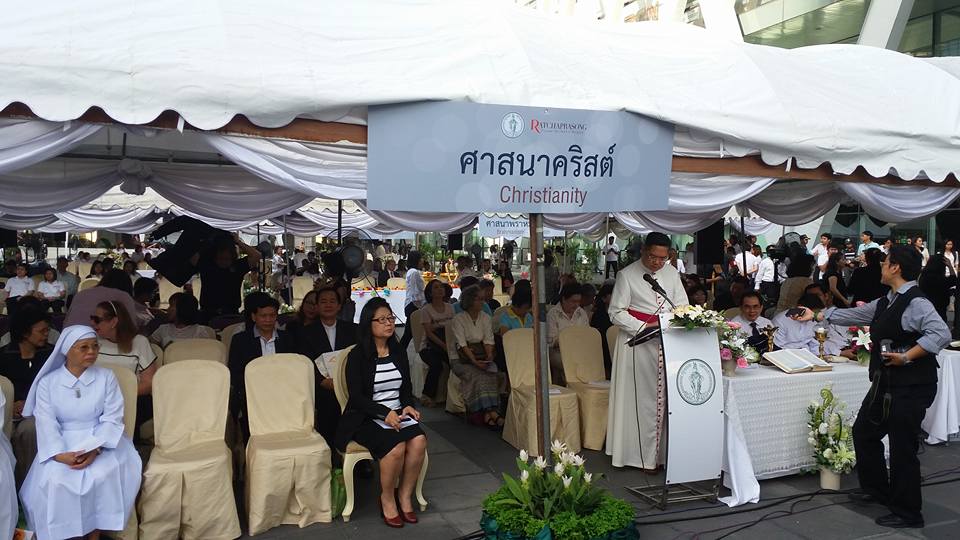|
An explosion at a major shrine in the heart of Bangkok at rush hour on Monday night, August 17 which killed 20 people and injured about 130 others, raises the question again, “How fragile is Thailand?” [Thanks to the Bangkok Post for this picture on Facebook of 5 religious groups on Friday, August 21 honoring Monday’s victims; see http://www.bangkokpost.com/news/general/664608/ for the story. Thanks to Kamolrat Surakit for the picture of the Christian participants, in which all branches of the Church were present. How vulnerable can a country be when all major religions coexist peacefully?] Still, there are a surprising range of answers to the question of Thailand’s viability, which seem to depend on the pundits’ interest in particular issues. In general no one expects the country to collapse but the vulnerable points are worth listing.
1. ECONOMY Thailand’s economy has cooled down. Thailand is no longer listed as one of the Asian Tigers. Some wonder if the coming of the ASEAN Economic Accords on December 31 of this year will expose the economy to ruin, as key protective taxes and laws will presumably expire. Others worry that Thailand’s whole banking system is linked to artificially inflated real estate values leading to massive unrealistic debt. 2. EXPECTATIONS Thailand has developed a growing middle class with elevated expectations. Those expectations are basically two: that education will entitle one to income that does not involve concerted manual labor, and everyone is entitled to an education. Further, income should be sufficient to not only free one from hard work but also to provide a higher level of necessities, goods and services that used to be considered luxuries. To make up for a reduced work force in labor intensive parts of Thai life (agriculture in particular, but also construction and industry), mechanization and immigrant labor will be relied on. Meanwhile, jobs with higher skill levels will have to expand. This is a pyramid scheme, some insist, meaning it is not sustainable. 3. FOREIGN RELATIONS It is sometimes overlooked that this is one of the rare times in Thailand’s history that there is no external threat to its sovereignty and territory. Indeed, now that there is no realistic outside threat the vast military is redundant unless there is an internal threat, which is constantly being identified. Some say it is being manufactured through incompetence and others say it is by design. Pretty much everybody feels that at some level the greatest threat to Thailand’s stability and prosperity is the military itself. 4. CULTURE Cultural monitors are constantly concerned about the erosion of Thai culture by globalization. The developing and expanding areas of language, arts and to some extent religion are innovative, or imitative of other popular cultures. It is hard to maintain anything uniquely Thai in any area that is widely popular. Classical arts are not popular. Pop culture is not traditional. The worry is that if unique Thai culture fades, so will Thai identity, and then all will collapse. It’s a long-term process, but constantly mentioned. 5. SUCCESSION Finally, comes the question of loyalty of the Thai people to the institution of the Royal Family, and to whatever sovereign should follow His Majesty the King now revered but with health issues. Seen from outside the country, the entire social elite in this very hierarchical and patron-client society is vulnerable if the Royal Succession is vulnerable. Ironically, the very apparatus that is designed to deflect public interference or participation in royal affairs is the thing that makes the institution appear to be vulnerable. It is highly questionable that if this, one of the last of the Royal households in the world, were to be replaced by a republic that Thailand would crumble. No doubt the elite would have to scramble, but the country is not that fragile.
0 Comments
Leave a Reply. |
AuthorRev. Dr. Kenneth Dobson posts his weekly reflections on this blog. Archives
March 2024
Categories |
| Ken Dobson's Queer Ruminations from Thailand |
|


 RSS Feed
RSS Feed
